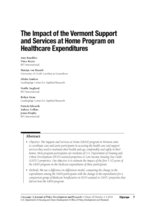Found 11 resources.
0
0
0
CLPHA developed a general data sharing template that public housing authorities (PHAs) and their health partners can customize to suit their data sharing and collaboration needs. Please feel free to comment to share any uses/modifications your organization made to implement into a partnership.
Topics: Affordable Care Act, CLPHA, Community development, Cost effectiveness, Data sharing, Dental, Depression, Dual-eligibles, Funding, Health, Healthy homes, Legislation & Policy, Low-income, Medicaid / Medicare, Mental health, Metrics, MTW, Nutrition, Obesity, Partnerships, Place-based, Preventative care, Racial inequalities, Research, SAMHSA, Smoke-free, Stability, Substance abuse, Supportive housing, Sustainability, TA
 Shared by Steve Lucas
on Aug 5, 2019
Shared by Steve Lucas
on Aug 5, 2019 0
0
0
As of 2015, the Centers for Medicare & Medicaid Services (CMS) pays for chronic care management (CCM) services for Medicare beneficiaries with two or more chronic conditions. CMS requires eligible providers to first obtain patients’ verbal (and, prior to 2017, written) consent, to ensure that patients who participate in CCM services understand their rights and agree to any applicable cost sharing. CCM providers must also enhance patients’ access to continuous and coordinated care, including ongoing care management.
Topics: Health, Low-income, Medicaid / Medicare, Research
 Shared by Housing Is
on Mar 18, 2019
Shared by Housing Is
on Mar 18, 2019 0
0
0

With persistent concerns about health care expenditures, the health care field has recognized a group of patients known as super utilizers—people with complex health needs and socioeconomic challenges who have very high levels of hospital use. A well-publicized team-based care management model to address the needs of these patients is the hotspotting model pioneered by the Camden Coalition of Healthcare Providers in New Jersey, first brought to national attention by an article in the New Yorker in 2011. So far, interest in programs to help super utilizers has outpaced the available evidence...
Topics: Health, Low-income, Medicaid / Medicare, Research
 Shared by Housing Is
on Mar 18, 2019
Shared by Housing Is
on Mar 18, 2019 0
0
0

The number of kids enrolled in Medicaid and the Children’s Health Insurance Program (CHIP) — two government health plans for the poor — fell by nearly 600,000 in the first 11 months of 2018, a precipitous drop that has puzzled and alarmed many health policy analysts, while several states say it reflects the good news of an improving economy.
Topics: Affordable Care Act, Child welfare, Early childhood, Health, Legislation & Policy, Low-income, Medicaid / Medicare, Research, Youth
 Shared by Housing Is
on Mar 8, 2019
Shared by Housing Is
on Mar 8, 2019 0
0
0
Improved access to health insurance contributed to reducing worry and stress associated with paying rent/mortgage or purchasing meals among low-income people. Expanding health insurance access may have contributed to increasing the disposable income of low income groups.
Topics: Affordable Care Act, Health, Housing, Low-income, Medicaid / Medicare, Mental health, Research, Stability
0
0
0
Medicaid coverage reduced the prevalence of undiagnosed depression by almost 50% and untreated depression by more than 60%. It increased use of medications and reduced the share of respondents reporting unmet mental health care needs by almost 40%.
Topics: Depression, Low-income, Medicaid / Medicare, Mental health, Metrics, Pacific Northwest, Research
0
0
0
Using multiple panels from the US Census Bureau’s Survey of Income and Program Participation, we find that participation in Temporary Assistance for Needy Families, the Supplemental Nutrition Assistance Program (SNAP), or public health insurance reduces the number of hardships low-income families with children experience by 48 percent and reduces the share who experience food insufficiency by 72 percent.
Topics: Child welfare, Cost effectiveness, Food insecurity, Legislation & Policy, Low-income, Medicaid / Medicare, Metrics, Research, Stability
0
0
0
Using administrative data from Massachusetts, this study analyzes the health care use and Medicaid expenditures of families who experienced one or more homeless episodes between 2008 and 2015 to investigate how health care use is related to emergency housing experiences.
Topics: Asthma, Child welfare, Depression, Health, Homelessness, Housing, Low-income, Medicaid / Medicare, Metrics, Pre-natal, Research
0
0
0
Work requirements in public housing are highly controversial, and
little is known about their impacts. We examined how implementation of a work requirement paired with supportive services by Charlotte Housing Authority has impacted residents’ overall well-being. Although the policy might improve well-being
by increasing household income, it might also engender stress through greater housing precarity.
Topics: Depression, Disabilities, Education, Food insecurity, Health, Housing, Low-income, Medicaid / Medicare, Mental health, Metrics, MTW, Partnerships, Racial inequalities, Research, South, Workforce development
 Shared by Housing Is
on Aug 1, 2018
Shared by Housing Is
on Aug 1, 2018 0
0
0
The Support and Services at Home (SASH) program in Vermont aims
to coordinate care and assist participants in accessing the health care and support services they need to maintain their health and age comfortably and safely in their homes. Most program participants are residents of U.S. Department of Housing and Urban Development (HUD)-assisted properties or Low-Income Housing Tax Credit
(LIHTC) properties. Our objective is to estimate the impact of the first 5 1/2 years of the SASH program on the Medicare expenditures of these participants.
Topics: Cost effectiveness, Dual-eligibles, East Coast, Health, Home visiting, Housing, Legislation & Policy, Low-income, Medicaid / Medicare, Metrics, Seniors
 Shared by Housing Is
on Aug 1, 2018
Shared by Housing Is
on Aug 1, 2018 0
0
0
A Research Review and Comment on Future Directions for Integrating Housing and Health Services
Topics: Affordable Care Act, Cost effectiveness, Data sharing, Exercise, Health, Homelessness, Housing, Low-income, Medicaid / Medicare, Mental health, Metrics, Nutrition, Obesity, Partnerships, Preventative care, Research, Supportive housing
 Shared by Housing Is
on Jul 11, 2018
Shared by Housing Is
on Jul 11, 2018 


